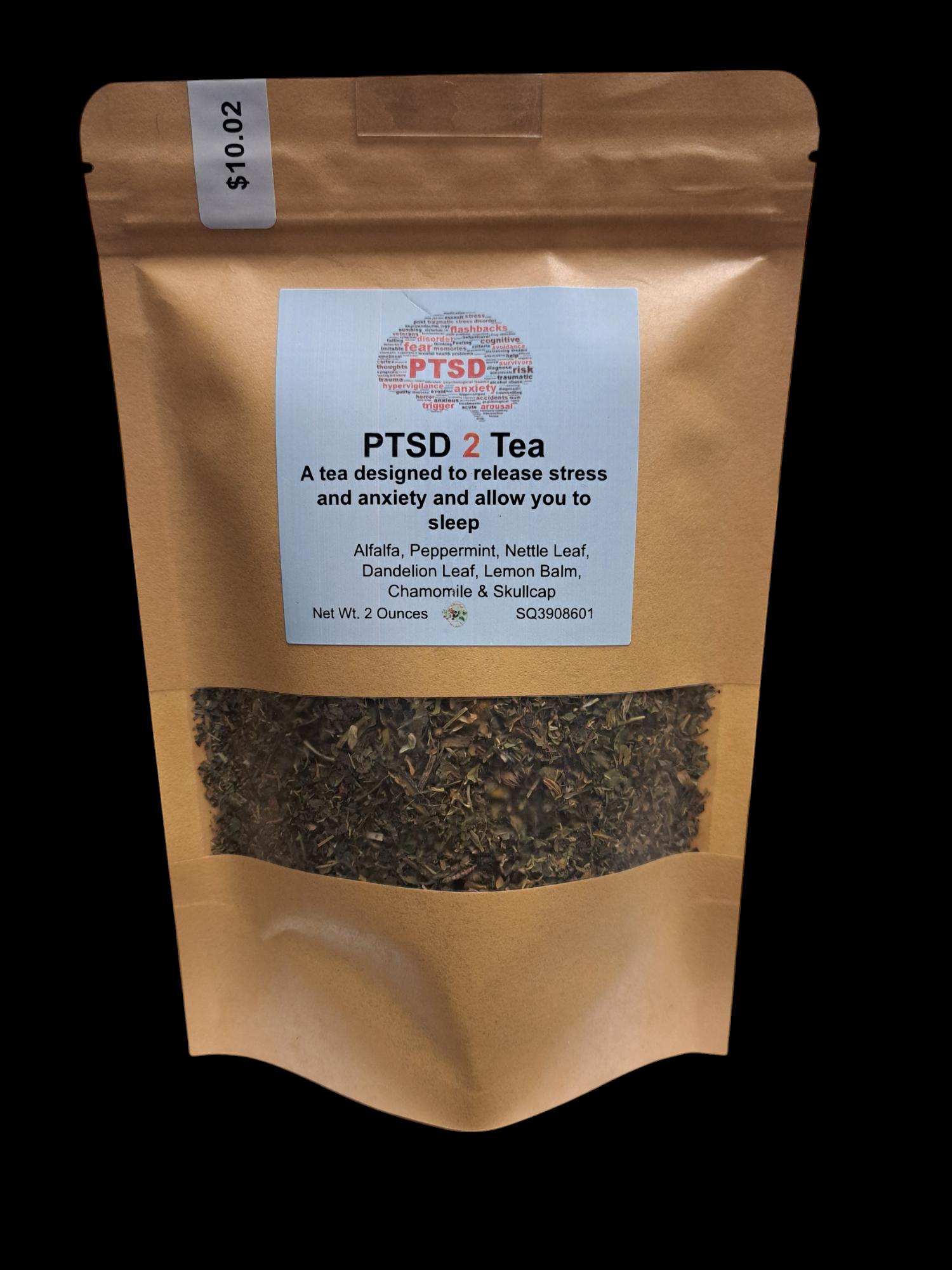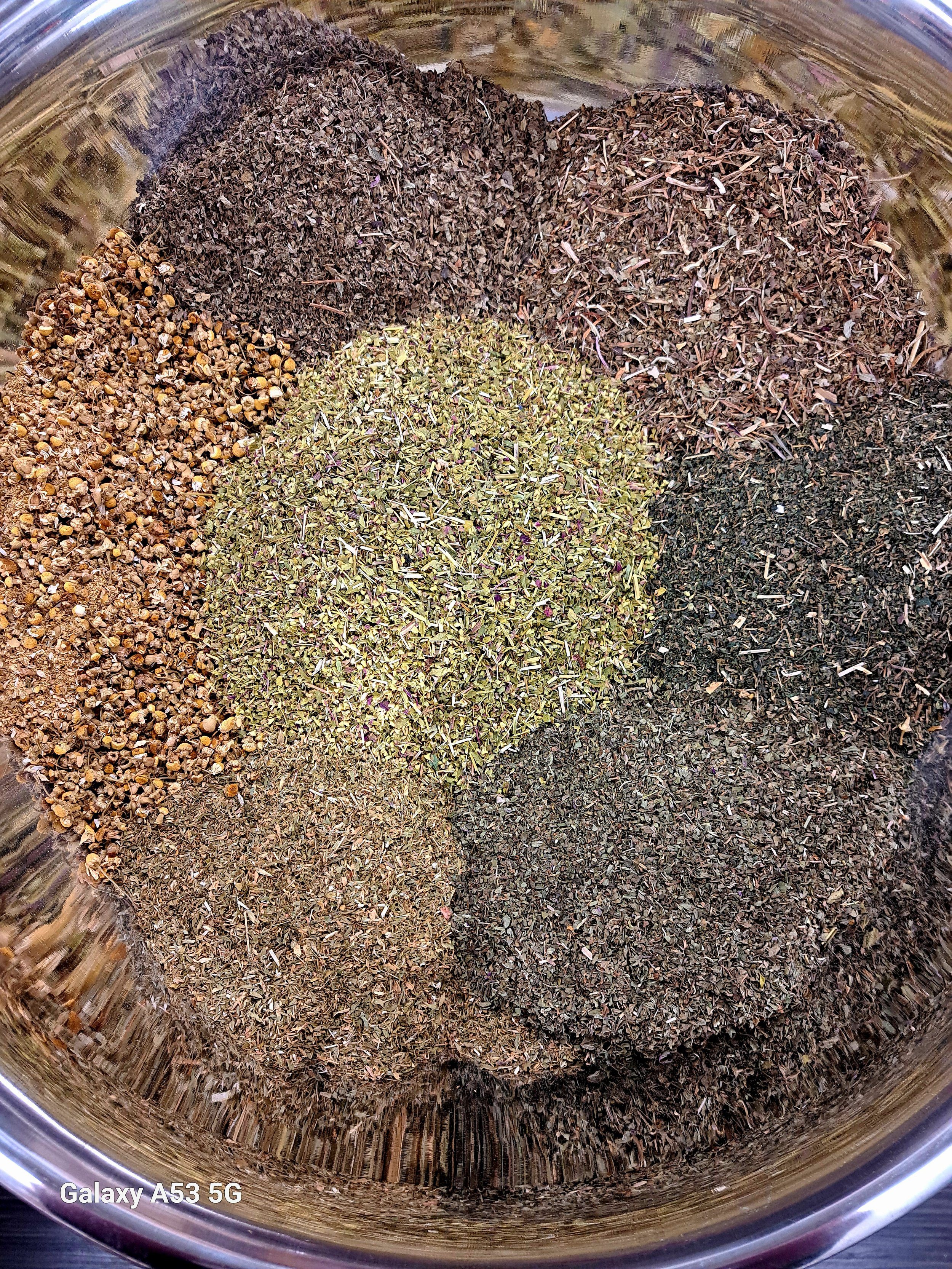A tea made with alfalfa, peppermint, nettle leaf, dandelion leaf, lemon balm, chamomile, and skullcap could offer several benefits for someone dealing with PTSD (Post-Traumatic Stress Disorder). Here's a breakdown of the potential benefits each ingredient brings to the blend:
1. Alfalfa:
Benefits: Rich in vitamins and minerals, alfalfa helps nourish the body, which can be beneficial for overall health and recovery. It's also known for its anti-inflammatory properties, which can help reduce physical stress.
PTSD Support: Alfalfa supports general well-being, which is crucial when dealing with the physical toll of PTSD.
2. Peppermint:
Benefits: Peppermint is known for its ability to ease digestive issues, reduce headaches, and improve mental clarity. It also has a calming effect on the nervous system.
PTSD Support: Peppermint can help alleviate symptoms of anxiety, tension, and digestive discomfort, which are common in PTSD.
3. Nettle Leaf:
Benefits: Nettle is highly nutritious, providing a range of vitamins, minerals, and antioxidants. It's also known for its anti-inflammatory properties.
PTSD Support: Nettle helps to nourish and strengthen the body, which can be beneficial in managing the physical stress associated with PTSD.
4. Dandelion Leaf:
Benefits: Dandelion leaf is a natural detoxifier, promoting liver health and aiding in digestion. It is also rich in vitamins A, C, and K.
PTSD Support: By supporting liver function and detoxification, dandelion leaf helps the body cope with stress and promotes overall wellness.
5. Lemon Balm:
Benefits: Lemon balm is well-known for its calming effects, making it excellent for reducing anxiety, stress, and insomnia. It also supports cognitive function and mood.
PTSD Support: Lemon balm can help soothe the nervous system, reduce anxiety, and improve sleep quality, which are all essential for managing PTSD symptoms.
6. Chamomile:
Benefits: Chamomile is widely used for its calming properties. It helps to reduce anxiety, promote relaxation, and improve sleep.
PTSD Support: Chamomile's calming effects can help manage anxiety and stress, making it easier to cope with the emotional and mental strain of PTSD.
7. Skullcap:
Benefits: is a calming herb traditionally used to reduce anxiety, support the nervous system, and ease stress-related conditions due to its mild sedative and anxiolytic properties.
PTSD Support: By promoting relaxation and reducing nervous tension, skullcap may help individuals with PTSD manage symptoms like anxiety, insomnia, and emotional dysregulation.
Overall Benefits for PTSD:
Calming and Soothing: The combination of chamomile, lemon balm, peppermint, and skullcap helps to calm the nervous system, reduce anxiety, and promote relaxation, which are crucial for managing PTSD symptoms.
Nutritional Support: Alfalfa, nettle leaf, and dandelion leaf provide essential nutrients that support overall health, helping the body to cope better with stress and recovery.
Stress Reduction: Skullcap’s nervine properties, along with the calming effects of lemon balm and chamomile, help reduce the overall stress response, making it easier to manage the emotional and physical toll of PTSD.
Flavor Profile:
The tea would likely have a refreshing and slightly sweet taste due to the peppermint and chamomile, with earthy undertones from the nettle and dandelion leaves, and a hint of bitterness balanced by the calming notes of lemon balm and the nervine qualities of skullcap.
This tea blend could be a supportive tool for someone managing PTSD, offering both physical nourishment and emotional comfort. However, it's always important to consult with a healthcare professional before starting any new herbal regimen, especially for those dealing with complex conditions like PTSD.



